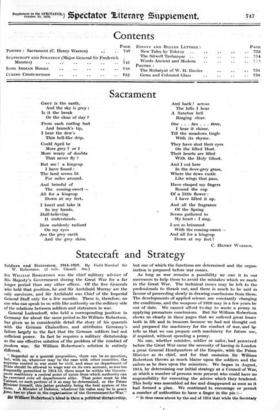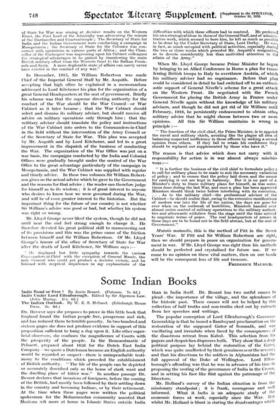Statecraft and Strategy
SIR WILLIAIR ROBERTSON was the chief military adviser of His Majesty's Government during the Great War for a far longer period than any other officer. Of the five Generals who held that position, he and Sir Archibald Murray are the only survivors, and Sir Archibald was Chief of the Imperial General Staff only for a few months. There is, therefore, no one who can speak to us with like authority on the military side of the relations between soldiers and statesmen in war.
General Ludendorff, who held a corresponding position in Germany for about the same period as Sir William Robertson,
has given us in considerable detail the story of his quarrels with the Geiman Chancellors, and attributes Gertaany's
failure largely to the fact that the German soldiers had not sufficient power. In fact he requires a military dictatorship as the one effective solution of the problem of the conduct of .Modem war. Sir William Robertson's solittion is entirely different.
Regarded aa- a: general proposition, there can be no question, but, with us, whatever may be the case with other countries, the 'supreme control in war must be civil, and since no department of :State should be allowed to wage war on its own account, as was too 'frequently permitted in 1914-15, there must be within the Govern- =Lent machinery a central point of union from which authority can texercised over all departments alike. That point must be the abinet, or such portion of it as may be determined, or the Prime Minister himself, this latter probably being the .beit system of the three. A Minister of befence, whatever his value may be in peace Pule+ has no 'place in the organization of the Government for War.'" Sir William Robertson's ideal is then a political-dictatorship,
but one of which the functions are determined and the organ- ization is prepared before war comes.
As long as war remains a possibility we owe it to our successors to help them to avoid the mistakes which we made in the Great War. The technical issues may be left to the professionals to thrash out, and there is much to be said in favour of proceeding slowly in drawing conclusions from them. The developments of applied science are constantly changing the conditions, and the weapons of 1918 may in a few years be out of date. We cannot afford to-day to waste a penny in applying premature conclusions. But Sir William Robertson shows us clearly in these pages that we suffered great losses both in life and in treasure because we had not thought out and prepared the machinery for the conduct of war, and lye tells us that we can prepare such machinery for future use, if required, without spending a penny.
No one, whether minister, soldier or sailor, had perceived before the Great War came the necessity of having in London a great General Headquarters of the Empire, with the Prime Minister as its chief, and for that omission Sir William Robertson throws as much blame upon the soldiers and the sailors as he does upon the ministers. We began in August, 1914, by determining our initial strategy at a Council of War, at which a number of persons were present who could have no responsibility for executing the advice which they tendered. This body was assembled ad hoc and disappeared as soon as it had formed a plan. We continued to encourage or permit a number of authorities to have a finger in the pie :— " It thus name about by -the end of 1914 that while the Secretary
of State for War was aiming at decisive results on the Western Front, the First Lord of the Admiralty was advocating the seizure of the Dardanelles and Constantinople ; The Secretary of State for India and the Indian Government were conducting a campaign in Mesopotamia ; the Secretary of State for the Colonies was con. cerned with operations in various parts of Africa ; and the Chan. rellor of the Exchequer was impressing upon his Cabinet colleagues the strategical advantages to be gained by transferring the main British military effort from the Western front to the Balkan Penin- sula and Syria. A more deplorable state of affairs can surely never have existed in the conduct of any war."
In December, 1915, Sir William Robertson was made Chief of the Imperial General Staff by Mr. Asquith. Before accepting that high office he explained in a memorandum addressed to Lord Kitchener his plan for the organization of a great General Headquarters at the seat of government. Briefly his scheme was that the supreme directing authority for the conduct of the War should be the War Council—or War Cabinet as it later became ; that the War Cabinet should select and dismiss its military adviser, but should receive all advice on military operations only through him ; that the military adviser should translate the policy and instructions of the War Cabinet into orders to the Commanders-in-Chief in the field without the intervention of the Army Council or of the Secretary of State for War. This plan was accepted by Mr. Asquith and by Lord Kitchener, and led to a great improvement in the dispatch of the business of conducting the War. The organization of the War Office was put on a war basis, the campaigns conducted by the India and Colonial Offices were gradually brought under the control of the War Office to the great advantage particularly of the campaign in Mesopotamia, and the War Cabinet was supplied with regular and timely advice. In these two volumes Sir William Robert- son gives us the actual advice which he gave to the Government
and the reasons for that advice ; the reader can therefore judge for himself as to its wisdom ; it is of great interest to anyone
who desires to know how we were governed during the War, and will be of even greater interest to the historian. But the important thing for the future of our country is not whether Sir William's advice was good or bad, but whether his system was right or wrong.
Mr. Lloyd George never liked the system, though he did not until near the end feel strong enough to change it. He therefore devoted his great political skill to manoeuvring out of its provisions and this was the prime cause of the friction between himself and Sir William Robertson. Of Mr. Lloyd George's tenure of the office of Secretary of State for War after the death of Loid Kitchener, Sir William says :—
" He displayed but little sympathy towards the various Ckuninanders-in-Chief with the exception of General Maude, the only General who could yet produce a decisive victory, and ho listened with sceptical impatience to my explanations of the difficulties with which these officers had to contend. He preferred his ownatrategical ideas to those of the General Staff, and of adminis. trative work, which seemed to bore him, he left as much as possible to be done by the Under Secretary of State, Lord Derby. He was, in fact, so much occupied with political activities, especially during the two or three weeks which preceded Mr. Asquith's resignation, as to devote considerably less than undivided attention to thei affairs of the Army."
When Mr. Lloyd George became Prime Minister he began by bringing to an Allied Conference in Rome a plan for trans.
ferring British troops to Italy to overthrow Austria, of which his military adviser had no cognizance. Before that plan could be considered in detail he had switched off town enthusi- astic support of General Nivelle's scheme for a great attack on the Western Front. He negotiated with the French Government for placing the British Army in France undef General Nivelle again without the knowledge of his military advisers, and though he did not get rid of Sir William until February, 1918, he persistently endeavoured to obtain other military advice that he might choose between two or more opinions. All this Sir William maintains is wrong in principle :—
" The function of the civil chief, the Prime Minister, is to appoint the naval and military chiefs, avoiding like the plague all idea of balancing suspected inefficiency in those officers by seeking a second opinion from others. If they fail to retain his confidence they should be replaced not supplemented by those who have it."
The reason is that advice which does not carry with it responsibility for action is in war almost always naisehies
VOILS
" It is further the business of the civil chief to formulate policy ; to call for military plans to be made to suit the necessary variations of policy ; and to ensure that the policy laid down and the means for carrying it out are kept in harmony. But it is no part of a Minister's duty to frame military plans for himself, as was some- times done during the last War, and once a plan has been approved Ministers should think twice before interfering with its execution, . . . As to the military chief—the professional advisor of the Cabinet—he should realize that, owing to the extensive ramifications of modern war into the life of the nation, the days are gone for ever when on the outbreak of hostilities, Ministers handed over almost entire control of military operations to the military authori- ties and afterwards withdrew from the stage until the time arrived to negotiate terms of peace. The real headquarters of armies in these days are to be found not in the field abroad, but at the seat of Government."
Mulatis mutandis, this is the method of Pitt in the Seven Years' War. If Pitt and Sir William Robertson are right, then we should prepare in peace an organization for govern- ment in war. If Mr. Lloyd George was right then his methods should be perfected and crystalized for future use. If we come to no opinion on these vital matters, then on our heads will be the consequent loss of life and treasure.
FREDERICK MAURICE.



























































 Previous page
Previous page